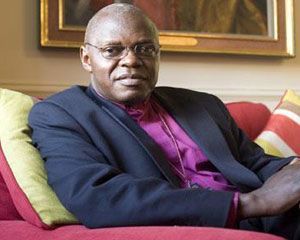
The Archbishop of York has said “there will be women bishops in my lifetime”, the day after the Church of England voted against their introduction.
Report by bbc.co.uk
Dr John Sentamu told the BBC the principle had been accepted.
General synod voting means that while 324 members voted for the move, and just 122 against, it was not passed.
Opponents’ key concerns were over provisions for traditionalist parishes opposed to women bishops to request supervision by a stand-in male bishop.
Speaking to BBC Radio 4’s Today programme, Dr Sentamu said: “The principle has already been accepted by the general synod. It has already been accepted by all the dioceses.
“So what we need to do is find the legislation – 99.9% of the legislation is there – it’s this little business of provision for those who are opposed.”
The Bishop of Durham, Justin Welby, who is the next Archbishop of Canterbury and a supporter of women bishops, tweeted overnight: “Very grim day, most of all for women priests and supporters, need to surround all with prayer & love and co-operate with our healing God.”
- Chamisa under fire over US$120K donation
- Mavhunga puts DeMbare into Chibuku quarterfinals
- Pension funds bet on Cabora Bassa oilfields
- Councils defy govt fire tender directive
Keep Reading
But critics of the change said it would not have unified the Church’s liberals and traditionalists.
Lay member Alison Ruoff said she had voted against the ordination of women bishops in order to keep the Church together.
“There are hundreds of churches in the Church of England which are standing with us and we were doing what was right for them – it’s not just me,” she said.
“This is to make sure that we can walk together as one Church of England – a broad Church, yes, but we want to be there without splits, without divisions.”
The Rev Prebendary Rod Thomas, chairman of the conservative evangelical grouping Reform, said: “We have avoided what could have been a disastrous mistake for our unity and witness.”
The proposed legislation paving the way for women bishops needed to gain two-thirds majority support in each of the synod’s three houses – bishops, clergy and laity – but fell short by six votes in the House of Laity.
The result was greeted with emotion, with some supporters of women bishops in tears.
The outgoing Archbishop of Canterbury, the Most Reverend Rowan Williams, who will give his farewell address later, spoke of his “deep personal sadness” after the vote.
He said: “Of course I hoped and prayed that this particular business would be at another stage before I left, and… it is a personal sadness, a deep personal sadness that that is not the case.”
The House of Bishops is meeting on Wednesday morning to “consider the consequences of the vote”, the Church’s media office said.
The Bishop of Norwich, the Right Reverend Graham James, said those Church members who were in favour of women bishops, but who had voted against the move because of concerns over the provisions for traditionalist parishes, were central to finding a solution.
“There’s a very big challenge, I think, to those who voted against but actually pledged themselves to see in what way they could move forward so that women can be bishops in the Church of England,” he said.
The House of Laity is the largest element of the general synod and is made up of lay members of the Church elected by its 44 dioceses.
The votes were 44 for and three against with two abstentions in the House of Bishops, 148 for and 45 against in the House of Clergy, and 132 for and 74 against in the House of Laity.
Christina Rees, a synod member who has spent 20 years campaigning for women bishops, said: “It feels as if the House of Laity betrayed the entire Church of England last night.
“And I think basically that the people, the sort of extremes in our Church – the very conservative evangelicals and very traditionalist Anglo-Catholics – have no idea how this will be read by most people.”
She said she thought that, to most people, “this just looks like blatant discrimination”.
Equalities minister Maria Miller said the vote outcome was “very disappointing”, and showed that the Church was “behind the times”, sources said.
Dr Sentamu said: “This morning, people have been saying, ‘The church has committed suicide, the church is dead.’ Well, dead people don’t converse. We’ve been conversing – we’ve not committed suicide at all.
“In the general synod, we are debating two important issues: the living wage, as well as youth unemployment. That’s not a dead church.”
He added: “And I hope I will be back some day to tell you what are the processes we are putting in motion to make sure women become bishops.”











